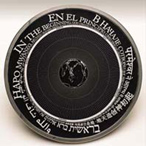| The Rosetta Project | 2004-03-23 16:20 1 comment |
 by Flemming Funch by Flemming FunchOne of the projects of the Long Now Foundation is The Rosetta Project: The Rosetta Project is a global collaboration of language specialists and native speakers working to develop a contemporary counterpart of the historic Rosetta Stone. In this updated iteration, our goal is a meaningful survey and near permanent archive of 1,000 languages. Our intention is to create a unique platform for comparative linguistic research and education as well as a functional linguistic tool that might help in the recovery or revitalization of lost languages in unknown futures.See, it is a bit of a problem to plan how you can leave a legacy of knowledge for future generations that actually lasts long enough for them to be able to access it, and that will be meaningful to them. A CD-ROM has a shelf-life of maybe 10 years. Most binary encoding formats would be pretty useless in a couple of hundred years, as they're just a bunch of zeros and ones, and unless somebody remembers what the encoding scheme was, it is no easy task to play them back. Their answer is to actually engrave regular letters into disks that will last a long time, and to include the text in multiple languages, just like the actual Rosetta Stone, which allows the decryption of Egyptian hieroglyphs, because a text was given simultaneously in hieroglyphs, Demotic writing, and Greek. |